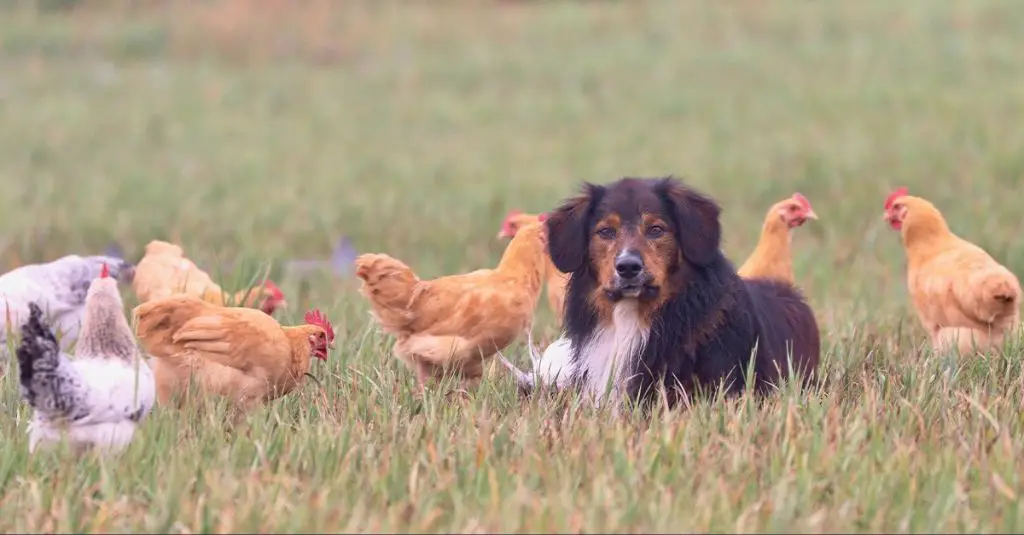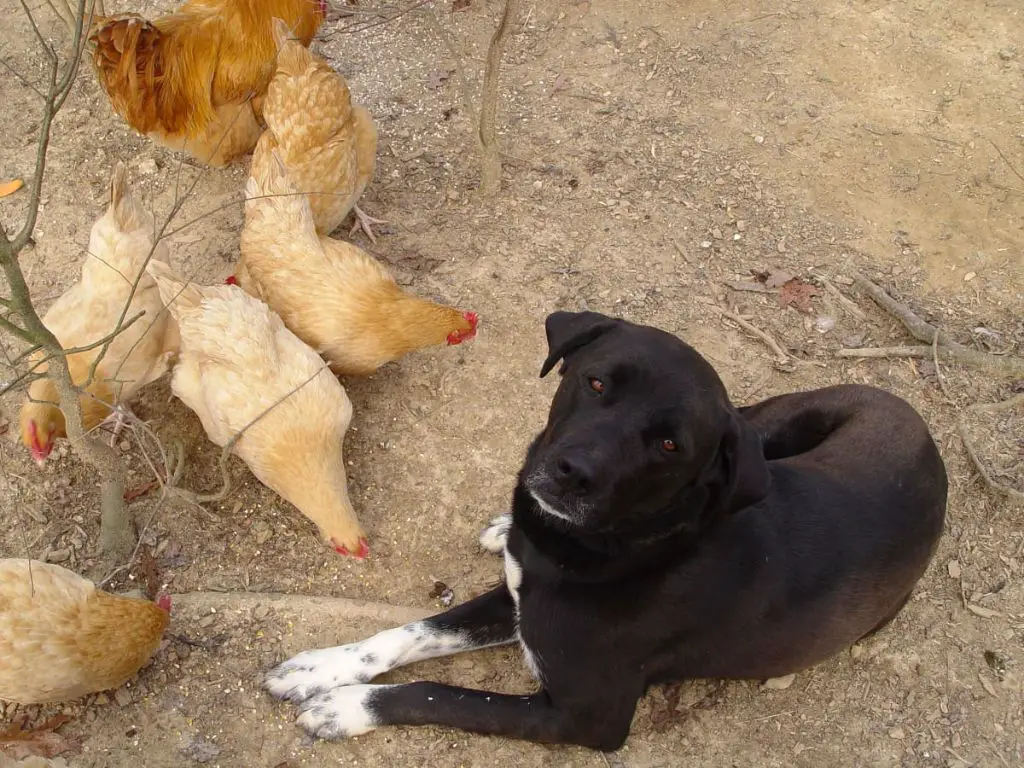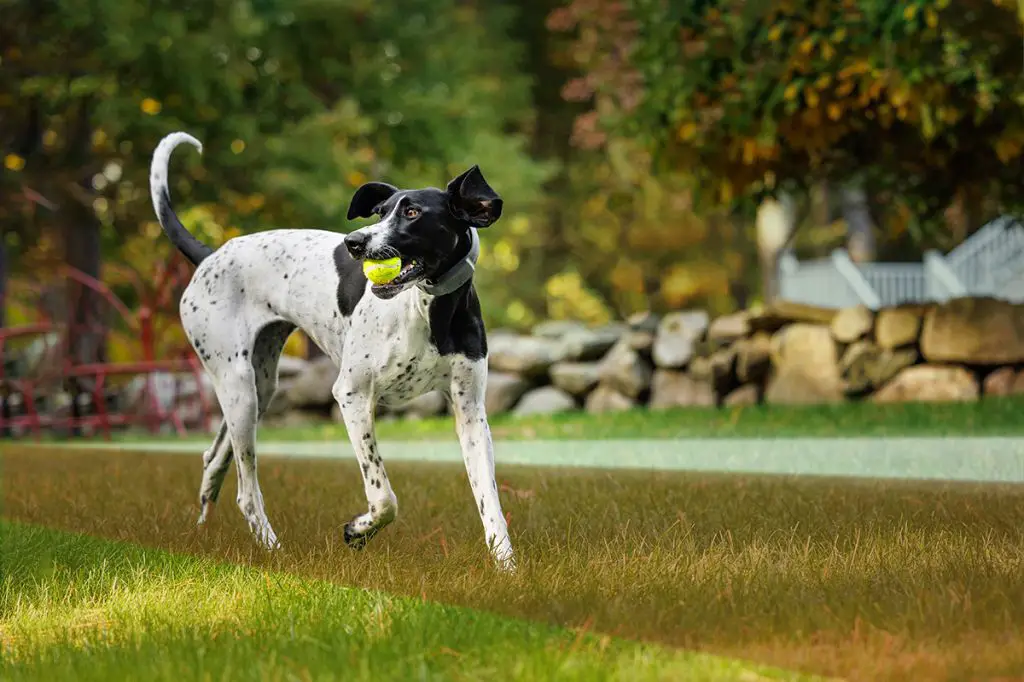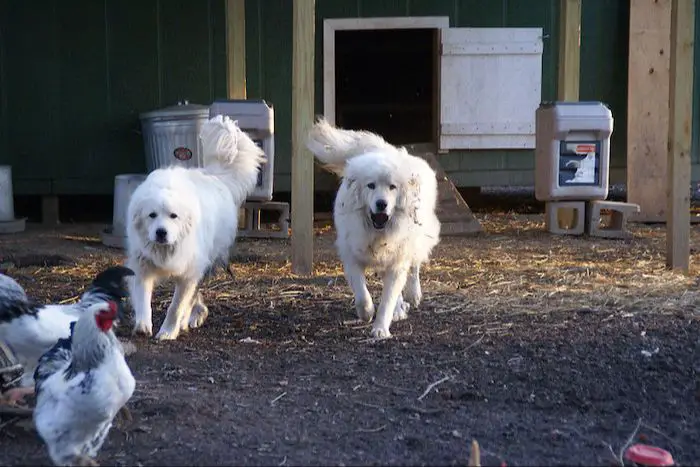Introduction
Chicken guard dogs, also known as livestock guardian dogs or LGDs, are dogs that have been bred over centuries specifically for the purpose of protecting chickens and other livestock animals from predators. The use of dogs to guard farm animals dates back thousands of years, with their protective instincts being passed down through selective breeding. In the past, chicken guard dogs were invaluable in protecting flocks from threats like wolves, coyotes, bears, and other predators. Today they continue to be an effective natural method for keeping chickens safe.
Some common breeds used as chicken guard dogs include Great Pyrenees, Akbash, Maremma Sheepdog, Anatolian Shepherd, and Kuvasz. These large dog breeds use their size, strength, and attentiveness to deter predators and keep chickens safe from harm. With proper socialization and training, chicken guard dogs will bond with their flock and patrol the area, alerting to any potential dangers. Their intimidating presence and loud bark are often enough to scare away most predators. Chicken farmers today continue to rely on these time-tested canine protectors to minimize losses in their flocks.
Benefits of Chicken Guard Dogs

Chicken guard dogs provide numerous benefits for protecting backyard flocks from predators like foxes, coyotes, raccoons, bobcats, hawks, and other threats. Having a guard dog with your chickens can help prevent losses and alert the flock to danger before an attack happens. These working dogs use their natural protective instincts to deter predators without necessarily needing to kill them (source).
Studies show that the presence of a guard dog significantly reduces chicken deaths from predators. Their acute hearing and sense of smell allows them to be alert to any nearby threats. The dog serves as an early warning system, barking to notify the flock so they can take shelter or mob predators as a group. Having a dog patrolling the perimeter also keeps many predators away entirely, as they avoid the risk of confrontation (source).
The strong bond that guard dogs form with chickens establishes a protective relationship. Research indicates the dogs view their flock as family and have an instinct to keep group members safe. Their protective stance and intimidating bark are often enough to scare away intruders. With a diligent guard dog on patrol, chickens can roam freely while minimizing losses to predators (source).
Common Breeds Used
Some of the most popular breeds used as chicken guard dogs include:
Great Pyrenees
The Great Pyrenees is a large, fluffy white dog breed that originated in the Pyrenees Mountains of France. They were historically used to guard livestock and have a very strong guarding instinct. Great Pyrenees are known for being gentle and patient with their flock while being protective and territorial of their space.
Anatolian Shepherd
The Anatolian Shepherd is a large dog breed that originated in Turkey as a livestock guardian. They are intelligent, independent thinkers that bond closely with their flock. Anatolian Shepherds are very intimidating in appearance which serves as a strong deterrent to potential predators. They have excellent hearing and sight to detect threats.
Maremma Sheepdog
The Maremma Sheepdog is a large white dog that originated in Italy as a livestock guardian. They are known for being loyal, calm, and gentle with their flock while remaining alert and ready to defend. The Maremma Sheepdog has a weather-resistant double coat allowing them to live outside year-round and guard their territory.
Akbash
The Akbash is a large, muscular white dog breed that originated in western Turkey. They are highly intelligent and independent thinkers but form strong bonds with their flock. Akbash dogs demonstrate fierce protectiveness if they sense a predator threat. Their intimidating appearance coupled with their brave nature make Akbash dogs excellent guardians.
Training a Chicken Guard Dog

Proper training is essential for raising an effective and trustworthy chicken guard dog. According to experts, there are some key tips for training a dog to safely protect backyard chickens:
Socialize with chickens from puppyhood – Introduce the dog to chickens starting at 8-12 weeks old. Supervise all interactions and reward calm behavior around the chickens. This early exposure will allow the dog to see the chickens as part of their family pack.
Use a secure enclosure – Keep the chickens and dog separated by a fence at first. This allows the dog to understand the chickens are to be protected, not chased. Gradually increase their access as the dog proves trustworthy. Source
Reward calm behavior – Anytime the dog remains relaxed and calm around the chickens, reward with treats and praise. This positive reinforcement builds the desired guardian response.
Discourage chasing – If the dog ever chases a chicken, interrupt the behavior with a firm “no” and redirect their attention to a toy or treat. With consistency, the dog will learn chickens are not for chasing.
Housing and Care
Guard dogs require proper housing and care to keep them comfortable and healthy on the job. This includes:
Provide shelter from elements – Dogs need access to a dry, draft-free shelter to protect them from weather extremes like hot sun, wind, rain, and cold. A barn or shed with clean bedding works well. https://backyardpoultry.iamcountryside.com/chickens-101/chicken-guard-dog-great-pyrenees/
Fresh water – Clean water should be available at all times in a tip-proof bowl or bucket. Change it daily. Dogs guarding poultry need ample water in warm months.
Quality food – Feed a high-quality commercial dog food formulated for working or active dogs. Amount varies by breed, age, and activity level.
Grooming – Certain breeds require regular brushing and bathing. Trim nails as needed. Check ears weekly.
Veterinary care – Annual exams, vaccines, preventatives, and prompt treatment if sick or injured are essential. Access to a vet knowledgeable in livestock guardian dogs is ideal.
Providing appropriate housing and care helps working guard dogs stay healthy and alert on the job protecting your flock.
Cost Considerations

Purchasing a chicken guard dog can be a significant investment. Here are some of the main costs to consider:
- Purchase price of puppy: $500-$2,000 depending on breed, pedigree, and breeder (Source)
- Vet bills: $300-$500 for initial puppy shots and checkups, plus $200-$400 annually (Source)
- Food: $500-$800 annually for a high quality dog food (Source)
- Supplies: $200-$300 for collar, leash, bowls, bedding, toys
- Fencing: $500-$2,000+ to fence off acreage or coop area
Proper preventative care and nutrition is important for any dog, but especially active working guard dogs. Budgeting approximately $1,000-$1,500 for first year costs and $1,000 annually after that is recommended.
Finding a Responsible Breeder
When looking for a chicken guard dog breeder, it’s important to find one that is responsible and reputable. According to the AKC, there are several things you should look for when evaluating a breeder:
Look for health and temperament certifications. Responsible breeders will screen their dogs for health and genetic issues common in the breed. They should provide documentation showing the parents have been cleared of issues that could impact the puppies (see How to Find and Work With Responsible Dog Breeders).
Visit the breeder’s facilities. You should be allowed to see where puppies are housed and meet the parent dogs. Look for clean conditions and healthy, well-socialized dogs. Beware of breeders who won’t let you visit or see all areas.
Interview the breeder about their practices. An ethical, responsible breeder will ask you questions to ensure their puppies are matched to suitable homes. They should only breed occasionally, focusing on health and temperament over profit. Avoid breeders who have many litters or who won’t provide in-depth information.
Taking these steps helps find a breeder committed to the dogs’ welfare. Be very cautious of those who won’t provide documentation, facility access, or transparency. Although initial cost may be lower, it signals irresponsible practices.
Adopting a Mature Dog
Adopting an adult livestock guardian dog can be a great option for adding protection to your flock or herd. Many rescues and shelters have mature dogs available that need good homes. Here are some tips for going this route:
Check with local and regional livestock guardian dog rescues to see if they have any dogs available for adoption. Organizations like Guardian Angels LGD Rescue specialize in re-homing these working dogs. Be sure to ask about the dog’s background and experience with livestock.
Assess the individual dog’s temperament carefully before adopting. Meet the dog multiple times and observe how it interacts with people as well as your animals if possible. A good rescue will match you with an appropriate dog for your situation.
Ongoing socialization and training will help a mature dog transition to your farm. Be patient and take time to bond with the dog and train it on proper behaviors around your stock.
Alternatives to Guard Dogs

While chickens definitely need protection from predators, guard dogs are not the only solution. Here are some effective alternatives for securing chickens without using guard dogs:
Secure Housing at Night
Chickens are most vulnerable at night when they roost in the coop. Providing secure housing is crucial. According to The Chicken Chick (https://the-chicken-chick.com/11-tips-for-predator-proofing-chickens/), an enclosed, covered chicken run will deter aerial predators. Invest in a sturdy, predator-proof coop and run to keep chickens protected.
Electric Fencing
Electric poultry net fencing provides an additional barrier around the coop and run area. The zap from the electric fence will deter mammalian predators like raccoons, foxes, and coyotes. Use a solar or battery powered energizer to electrify the fence (Growing Back to the Land, https://www.growingbacktotheland.com/post/predator-control-for-poultry-that-works).
Livestock Guardian Animals
Guard animals like llamas, donkeys, or guardian geese can also protect chickens. These animals will confront predators and sound an alarm. Be sure to introduce guardian animals slowly and supervise interactions with chickens (Quora, https://www.quora.com/Do-chickens-need-protection-from-predators-like-dogs-If-so-how-can-it-be-achieved-without-sacrificing-their-freedom-in-the-process-keeping-them-in-an-enclosed-area).
Conclusion
A chicken guard dog can provide invaluable protection for your flock, deterring predators and giving you peace of mind. Recapping the benefits, guard dogs form strong bonds with the chickens they watch over and will stay closely alert to any threats. They can help reduce losses from foxes, coyotes, hawks, raccoons, and other predators that may target your birds.
However, taking on a guard dog is a major commitment. You need to invest time into proper socialization, training, and care for the dog. Providing housing, food, exercise, affection, and veterinary needs requires daily effort. Additionally, certain breeds like the Great Pyrenees will shed profusely and require extra grooming.
If you decide a guard dog is right for your situation, do your research to find responsible breeders specializing in livestock guardians. You can also check with local rescues or shelters to potentially adopt a mature dog with guarding instincts. Take your time finding the right individual dog with an appropriate temperament for bonding with your flock.
